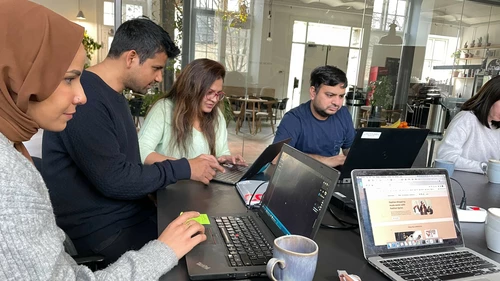The Nordic Pulse
The Nordic Pulse
We asked the people in the Nordics how they feel about their economic situation and the choices they make right now. Here is what they answered.
We asked the people in the Nordics how they feel about their economic situation and the choices they make right now. Here is what they answered.


What are the goals for our own money here in the Nordics? Do we think alike? Do we dream of the same things? The simple answer is no, but we do have some fundamental things in common.
Read more
Did you know how unequal many financial areas still are for women? Here's a list of facts that might surprise you.
Read moreThe Nordics is not only a place. It’s a set of values we share. Belief in the future, sustainability and personal ambition. These values make the Nordic pulse. It’s what makes this region successful and creates value for our people. That’s why we’re launching the Nordic Pulse. A way to take the pulse of how well the society is in synch with these values during times of economic change. The Nordic Pulse will be updated twice per year.
The importance of sustainability and the ability to make responsible, environmentally and socially conscious decisions.
The ability to pursue individual aspirations and goals.
The level of confidence in one’s future economic prospects.
The ability to understand and feel in control of one's personal economy, regardless of gender, age or other such differences. In 2024 we added a couple of questions on fraud. Results will be reported in different articles.
Although not exclusive to the Nordics, these four areas tap into values associated with the region and important for its growth and economic success. In the recent Sustainable Development Report for 2022, the four Nordic countries were top-ranked among countries most rapidly transforming into sustainable and equal societies. In the World Value Survey, the Nordic countries are top-ranked on self-expression, where environmental protection and gender equality are foundations.
These values are also aligned with Nordea’s purpose of enabling dreams and aspirations for a greater good.
The Nordic countries, known for their high standard of living and well-functioning economies, have a strong tradition of sustainable development. Sustainability is not only important from an ethical and social perspective but also an economic one. It is a major economic growth area and business opportunity, with new industries emerging. The Nordic region is home to innovative companies and a highly skilled workforce that is well-positioned to take advantage of the growing demand for sustainable products and services. By embracing sustainability, the region can continue to drive economic growth and competitiveness while also addressing environmental and social challenges.
By “sustainability,” we refer to both environmental and social responsibility. We measure whether respondents consider sustainability to be an important issue and their perceived ability to live sustainably by making environmentally and socially conscious decisions. We track whether respondents have felt the need to deprioritize sustainable choices, given their economic situation.
Personal ambition encourages individuals to set and pursue goals, whether in their careers, personal lives or communities. Collectively, this can lead to increased productivity, innovation and entrepreneurship, which are key economic growth and development drivers. In addition, personal ambition can help create a more dynamic and competitive economy, as individuals seek new opportunities and take risks to achieve their goals. The Nordic countries have a strong tradition of valuing personal ambition, which has helped create a highly skilled and motivated workforce that is well-positioned to drive economic growth and competitiveness.
Personal ambition is the driving force that motivates an individual to pursue their goals and succeed in their endeavors. We measure whether one has felt the need to put a personal goal on hold, given their financial situation. We also measure what personal goals are put on hold most, such as financial and personal growth goals.
A positive outlook on one’s economic future can help drive investment, innovation and economic growth, as individuals and businesses feel confident about their prospects and take on new risks and opportunities.
In the Nordic region, belief in the future is shaped by several factors, including strong economic fundamentals, high levels of education and skills and a well-functioning social welfare system. This fosters a sense of security and stability that encourages individuals and businesses to plan for the future and invest in their success.
"Belief in the future" measures respondents’ level of optimism regarding their economic future, which affects financial planning, decision-making and financial security.
Financial literacy involves not only having specific knowledge and skills but also the confidence to make decisions to achieve financial well-being. When people manage their own economy well, they contribute to a secure future for themselves and stable financial markets for society. A more inclusive and equal society can lead to improved social cohesion and stability, creating a more favourable environment for business and investment and helping to drive a healthy and thriving economy.
With "financial literacy," we are measuring people’s ability to understand and feel in control of their personal economy. The Nordic Pulse will provide insights into differences in financial literacy based on age, region, gender, income, marital status, as well as other factors that may play a role.

Did you know that our name comes from the combination of Nordic and ideas?
We are a universal bank with a 200-year history of supporting and growing the Nordic economies. Our values are deeply rooted in these open, progressive and collaborative societies. We are the largest bank in the Nordics and have a strong market position within our four business areas: Personal Banking, Business Banking, Large Corporates & Institutions and Asset & Wealth Management. Mindful of our responsibility towards current and future generations, we have made sustainability an integrated part of our business strategy. We enable sustainable choices for our customers, engage in active ownership and drive change through our lending and investment decisions.
Read more about who we areIf you are a journalist looking for more information please reach out to our press teams.
If not, you are welcome to reach out here:
Contact us
Insights
In september Nordea started a new community engagement programme: the refugee programme. The aim is to enable refugees to re-build financial security and better financial wellbeing in the future.
Read more
Digital banking
The coronavirus pandemic meant that many had to adapt and quickly become more digital both to be able to meet other people and carry out their business. At Nordea we also adapted and offered digital coaching for many who needed it – and in December we won the Digital Coach of the Year award in Sweden for our efforts.
Read more
Insights
In 2022 over 1,750 colleagues participated in a community engagement programme, with over half of them supporting refugees. Those who participated say the experience is rewarding – and that even a little help can go far.
Read more